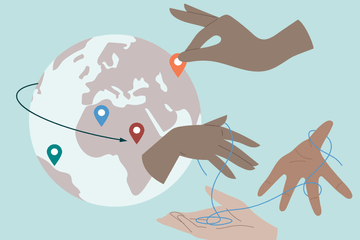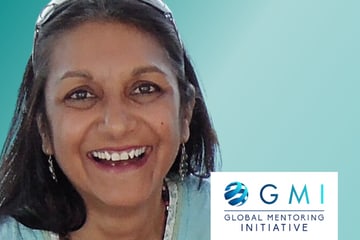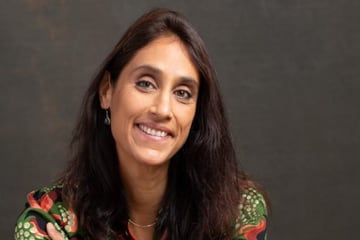Your Journey to a More Locally Led Practice
"Why aren't we there yet?"
A collaborative workshop series
Discussions on how to integrate more equitable power dynamics and decision-making into global cooperation and humanitarian action have been prevalent in the sector for many years. Translating policy and commitments into operational change is even more challenging when the barriers to change are both systemic and ideological. Taking action ultimately requires reflection and awareness, looking at both 'self' and one's role within the 'system'.
This three-part series of collaborative workshops explores the practice of localisation, local ownership or locally led development and humanitarian action.

Event reserved for staff (all functions, all geographical locations) of cinfo member organisations and their partners, as well as the FDFA and SECO.
Get in touch

Join us and you will...
Get an overview of the evolution of the 'localisation discourse', policy and agenda
You will also learn about the challenges of translating this into action in development, humanitarian response and research.
Learn, understand and share about power, power imbalances and (structural) racism
You will reflect on your own attitudes, behaviours and negative narratives.
You will also gain a better understanding of other participants' individual and organisational challenges around bias, power dynamics and agency.
Have the opportunity to share your own challenges and practices
You will also learn from existing models and experiences.
Three-part series of collaborative workshops
Over four and a half days, the workshops aim to provide a platform for self-reflection as well as pragmatic support and shared models of practice to help you or your organisation get unstuck or move into action.
Part 1 - Why Now? Understanding Local Ownership & Locally Led Development and Response in Practice
01 June 2023, 09:30-12:00 + 14:00-16:30 (CEST)
Online
In this session we will...
- explore what is the problem that locally led seeks to address, the different motivations or purposes and why ‘now’ (looking back since 2016)
- discuss different interpretations of locally led, from the perspective of various stakeholders
- provide an overview of different barriers to promoting locally led practice - and explore ideas on how to reduce them
- provide space for sharing experiences and learning from how other organisations are dealing with this.
Part 2 - Managing Relationships: Identity, Power and Privilege
29 June, 09:30-17:00 (CEST)
Biel (Switzerland) with streaming
+
30 June, 09:30-12:00 (CEST)
Online
In this session we will...
- explore the attitudes and behaviours needed to support locally led practice
- explore personal identity, power and privilege and understand different dimensions of power
- explore decolonisation and anti-racism and how they impact on locally led practice
- accompany participants in setting their own personal intentions.
Part 3A - Are we fit-for-partnering?
September 6th, from 09:00 to 12:30 (CEST), online.
In this workshop we will look at the notions of ‘partner’ and ‘partnership’, review why organisations decide to collaborate and what constitutes an equitable partnership in the first place.
What actually makes an organisation fit-for-partnering? Join us and a local partner, in addressing some of these key questions:
- Why do we decide to collaborate or to implement directly?
- What could more equitable partner-‘selection’ and due diligence approaches look like?
- What relationship do our contracts with sub-grantees express?
- How fit-for-partnering is our organisation?
Part 3B - Equitable partnerships and local leadership in practice
September 7th, from 09:00 to 12:30 (CEST), online.
In this workshop, we will explore further due diligence and how we enter partnerships. We will discuss examples of why both the quantity and quality of financing matter, how to approach risk sharing and risk transfer, as well as what constitutes effective and ineffective capacity-sharing.
How can national or local actors step in and step up, when international actors step back?
Join us to share your own experiences and hear the experiences of a national actor on sharing of financing and risks and how they impacted on their organisation and target groups. Some of the key questions:
Look forward to exploring:
- In which key areas of interaction between international and national/local organisations do national actors want to see change?
- What is the practical meaning of fair sharing of financial resources?
- How do we start adopting a risk sharing approach?
- What are more and less effective capacity-sharing approaches?
Part 3C - What future role for INGOs and international actors?
September 27, from 09:00 to 12:30 (CEST), online.
In this session, we will examine some of the frequently expressed concerns and fears that keep INGOs from adopting a partnering approach. What stands in the way and how does this reflect on their fundraising and public communications?
Join us and a global actor to unpack some these key questions:
- What does it mean, in practice, if we want our organisation to be anti-racist and to decolonise aid?
- How can we play the role of ‘intermediary’ and what does that mean practically?
- What are our main concerns if as international actors we share more power with local actors, or let them have the leadership? How do these concerns relate to our mission and values?
- Whose interests are these concerns mostly about?
- If we stop doing much of what we used to do ourselves, and let it now be done by national/local actors, what becomes possible?
Part 3D - What role do we have in transforming our system?
September 28, from 09:00 to 12:30 (CEST), online.
In this workshop we will look at focusing on the challenges and opportunities of systemic change.
What constraining factors exist? What can we do more of to ensure that we are creating an enabling environment for equitable partnerships to grow?
We will look at:
- What important leverages exist to impact change on our system?
- What are governments and institutional donors doing to be more enabling of equitable partnerships in Switzerland and beyond?
- How can NGOs and organisations position themselves and what external factors may influence what they can practically achieve?
This series of workshops will lead up to cinfo's Immersion Day 2023 in November. More information will follow.
Your take-aways as a participant
You will...
- understand the different interpretations of locally led development and humanitarian action and how to assess meaningful change in localisation efforts.
- learn strategies for navigating power dynamics and dismantling racist structures in your environment.
- increase your awareness of individual and organisational biases, power dynamics and agency.
- gain concrete action steps for implementing locally led practices in your organisation.
Overall, this collaborative learning series will provide you with a comprehensive understanding of locally led practice and strategies for facilitating change within yourself and your organisation.

Facilitators



Registration
Collaborative workshop series
- This event is reserved for staff (all functions, all geographical locations) of cinfo member organisations and their partners, as well as the FDFA and SECO.
- Participation in all workshops is recommended but not required.
Capacity building with cinfo
At cinfo, we promote open dialogue on global cooperation issues and support individuals and organisations in strengthening their efforts towards locally-led practices. Our experience and understanding of the development and humanitarian sectors allows us to tailor our services to meet different needs.
Our recent competency study has provided insights into future skills to promote equity and create a more impactful sector. We can help you navigate the complexities of development and humanitarian action, giving you greater clarity, courage and confidence.
